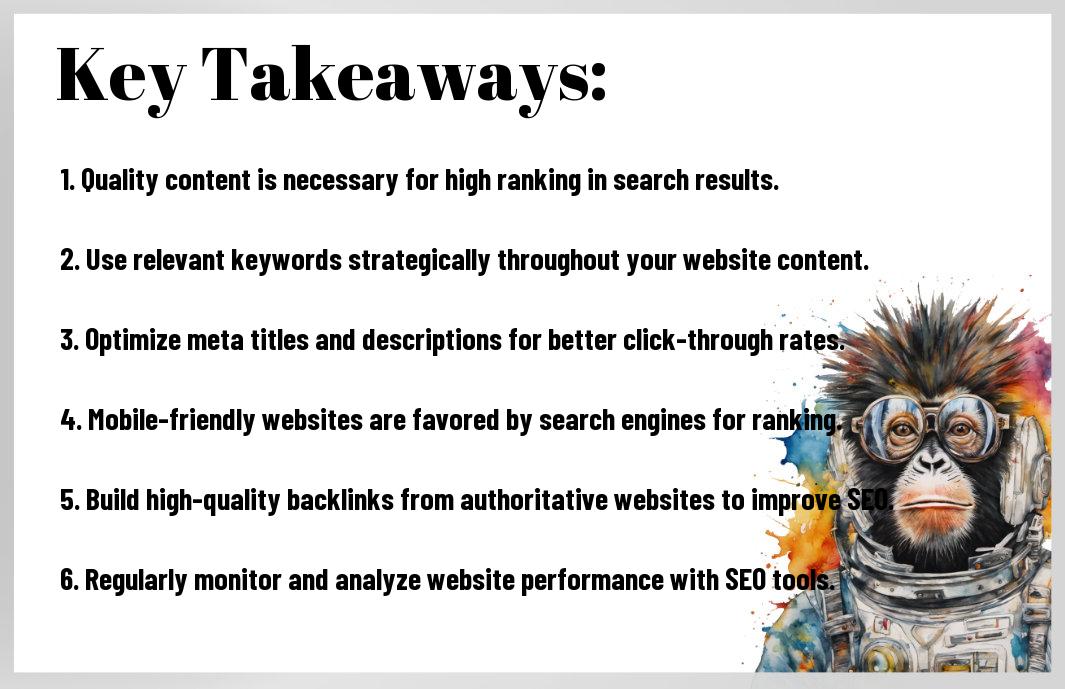Proper utilization of SEO techniques can make or break a website’s online success. In today’s digital world, having a strong SEO strategy is vital for improving your website’s visibility, driving more traffic, and increasing conversions. It is crucial to understand the importance of keywords, meta tags, and backlinks in optimizing your website for search engines. In this blog post, we will explore into expert tips and techniques to help you maximize your website’s potential with SEO.
Key Takeaways:
- Keyword Research: Conduct thorough keyword research to identify the most relevant and high-traffic keywords for your website.
- Optimize On-Page Elements: Ensure your website’s title tags, meta descriptions, headings, and content are optimized with the identified keywords.
- Build Quality Backlinks: Focus on acquiring high-quality backlinks from reputable websites to improve your website’s authority and search engine rankings.

Understanding SEO Fundamentals
How Search Engines Work
Fundamentals: Search engines like Google use complex algorithms to scan and rank websites based on various factors. These factors include keywords, website authority, relevance, and user experience. Understanding how search engines work is crucial for optimizing your website’s visibility and driving organic traffic.
The Pillars of SEO: Content, Technical, and Off-site
Technical: The three main pillars of SEO are content, technical, and off-site optimization. Content refers to the quality and relevance of the information on your website, technical involves the backend structure and coding of your site, and off-site focuses on external factors like backlinks and social signals. Ignoring any of these pillars can significantly impact your website’s visibility and ranking on search engine results.
Advanced Keyword Research and Optimization
- Identifying High-Value Keywords
- Strategies for Incorporating Keywords Naturally
| Your Target Audience | Competition Analysis |
To effectively identify high-value keywords for your website, it is imperative to understand your target audience’s search behavior and the keywords they are using. Conduct thorough competition analysis to identify gaps and opportunities in the market that you can capitalize on.
| Quality Content | Long-Tail Keywords |
The key to successful keyword optimization is integrating them seamlessly into your content. The use of quality content that is relevant to your audience will naturally incorporate keywords. Moreover, long-tail keywords can help target specific search queries and drive targeted traffic to your site.
Strategies for Incorporating Keywords Naturally
For instance, when creating blog posts, ensure that the main keyword appears in the title, meta description, headers, and within the first 100 words of the content. Additionally, sprinkle related keywords throughout the content to reinforce the topic relevance and improve SEO.
Recall, keyword optimization is an ongoing process that requires constant monitoring and adjustments to stay ahead of the competition and maximize your website’s potential in search engine rankings.
Technical SEO Best Practices
Site Architecture and URL Structure
Many elements go into optimizing a website for search engines, and site architecture and URL structure play a crucial role in this process. One key factor to consider is creating a clear hierarchy for your website that helps search engine crawlers understand the relationship between different pages. Additionally, optimizing your URL structure by including relevant keywords can improve your site’s visibility in search results.
Improving Site Speed and Mobile Usability
Technical SEO encompasses various strategies to enhance site speed and mobile usability, both of which are critical for user experience and search engine rankings. Technical optimizations such as minimizing CSS and JavaScript files, leveraging browser caching, and utilizing responsive design can significantly improve site speed and mobile responsiveness. Ensuring that your website loads quickly and is easy to navigate on mobile devices can lead to higher organic traffic, lower bounce rates, and better search engine rankings.
Content Creation and Optimization
All 20 SEO Tips to Boost Organic Rankings & Traffic are crucial for your website’s success, but none more so than Content Creation and Optimization. This chapter examines into the importance of crafting quality content and utilizing multimedia for maximum impact on your SEO efforts.
Crafting Quality Content for User Engagement
Any successful SEO strategy begins with crafting quality content that engages users. Your content should be relevant, informative, and valuable to your target audience. By creating content that resonates with users, you can increase engagement, reduce bounce rates, and ultimately improve your search engine rankings.
Utilizing Multimedia and Structured Data
With the rise of multimedia content, it has become crucial to incorporate videos, images, and infographics into your website to enhance user experience. Additionally, utilizing structured data markup can help search engines better understand your content and display rich snippets in search results. This can lead to higher click-through rates and better visibility for your website.
User engagement is key to a successful SEO strategy. By incorporating multimedia elements and structured data into your content, you can enhance user experience and improve your website’s visibility in search engine results. Keep in mind, quality content is king, and by focusing on creating valuable, engaging content, you can maximize your website’s potential with SEO.

Building and Managing Your Backlink Profile
Now, check out my article on Maximizing Your Website’s Potential with Search Engine Optimization for more insights into improving your website’s SEO performance.
Ethical Link Building Techniques
With the ever-evolving landscape of SEO, it’s crucial to focus on ethical link building techniques to ensure long-term success for your website. By creating high-quality content that naturally attracts backlinks from reputable sources, you can improve your website’s authority and credibility in the eyes of search engines. Avoid black hat tactics like buying links or engaging in link schemes, as these can result in penalties that may harm your website’s rankings.
Monitoring and Auditing Your Backlink Portfolio
Managing your backlink profile involves regularly monitoring and auditing the quality of your inbound links to identify any potentially harmful or irrelevant links. Tools like Google Search Console and Moz’s Link Explorer can help you track your backlinks and assess their impact on your SEO performance. It’s vital to regularly audit your backlink profile to remove any toxic links that could be dragging down your website’s rankings.
Profile: By keeping a close eye on your backlink profile and implementing ethical link building techniques, you can effectively enhance your website’s SEO performance and drive more organic traffic to your site.
Local SEO and Mobile Optimization
Unlike other aspects of SEO, local SEO and mobile optimization are crucial for businesses looking to target specific geographic locations and capture mobile users. To learn more about how to improve your site’s ranking, check out Five Ways to Improve your Site’s Ranking (SEO).
Optimizing for Local Searches
For businesses targeting local customers, optimizing for local searches is important. This involves strategies such as creating a Google My Business listing, optimizing your website’s content with local keywords, and getting featured in local directories. By ensuring your business information is consistent across all online platforms, you can improve your chances of showing up in local search results and attracting nearby customers.
Catering to Mobile-First Indexing
Mobile-first indexing is a shift in Google’s ranking system that prioritizes the mobile version of websites over desktop versions. MobileFirst, it’s crucial for websites to be mobile-responsive, have fast loading times, and provide a seamless user experience on mobile devices. Ensuring your website is optimized for mobile users can improve your search rankings and reach a wider audience. Another key factor to consider is having structured data markup, which helps search engines understand your content and display it prominently in mobile search results.
Measuring SEO Success
Essential SEO Metrics and KPIs
On your journey to optimizing your website’s SEO, it is crucial to track and measure the right metrics and key performance indicators (KPIs) to gauge the effectiveness of your efforts. Some crucial SEO metrics include organic traffic, keyword rankings, bounce rate, conversion rate, and backlink profile. These metrics provide valuable insights into how well your SEO strategies are performing and where improvements can be made.
Tools for Tracking and Analyzing SEO Performance
Success in SEO heavily relies on the ability to track and analyze data effectively. Utilizing tools like Google Analytics, Google Search Console, SEMrush, Moz, and Ahrefs can provide deep insights into your website’s performance. These tools help in monitoring keyword rankings, analyzing backlinks, tracking organic traffic, and identifying technical issues that may affect your SEO efforts. Leveraging these tools can help you make data-driven decisions to enhance your website’s visibility and ranking on search engines.
Essential: Investing in reliable tools for tracking and analyzing SEO performance is crucial for the success of your SEO strategies. These tools not only provide valuable insights but also help in identifying areas of improvement and opportunities for growth. By leveraging the data and insights from these tools, you can stay ahead of the competition and continuously optimize your website for better search engine visibility.
Staying Updated With SEO Trends
Keeping Up With Algorithm Changes
One of the key aspects of having a successful SEO strategy is staying informed about algorithm changes. Search engines like Google routinely update their algorithms to improve user experience and deliver more relevant search results. To stay ahead of the curve, make sure you are subscribed to reliable SEO news sources and blogs that regularly report on algorithm updates.
Continuous Learning and Adaptation
Staying on top of SEO trends requires continuous learning and adaptation to the ever-evolving digital landscape. For instance, Google’s algorithm updates can significantly impact website rankings, and failing to adapt to these changes can result in a drastic loss of traffic and visibility. Therefore, it is crucial to continuously educate yourself through courses, webinars, and industry conferences to stay ahead of the competition.
To wrap up
Upon reflecting on the insights shared in this article, it is clear that implementing a strong SEO strategy is crucial for maximizing your website’s potential. By following the pro tips outlined here, such as optimizing content, enhancing user experience, and building quality backlinks, you can significantly improve your site’s visibility and drive more organic traffic. Remember that SEO is a continuous process that requires monitoring, analysis, and adaptation to stay ahead of the competition. Keep refining your strategies, staying up to date with the latest trends, and consistently delivering valuable content to ensure that your website maintains a strong presence in search engine results. With dedication and the right approach, you can unlock the full potential of your website with SEO.
FAQ
Q: What is SEO?
A: SEO stands for Search Engine Optimization. It is the practice of increasing the quantity and quality of traffic to your website through organic search engine results.
Q: Why is SEO important for my website?
A: SEO is important because it helps your website rank higher in search engine results, making it more likely that users will click on your site. This increased visibility can lead to more traffic, more leads, and ultimately more revenue for your business.
Q: What are some key tips for maximizing my website’s potential with SEO?
A: Some key tips for maximizing your website’s potential with SEO include: conducting keyword research to target the right terms, optimizing your website’s metadata and content, building quality backlinks, improving site speed and mobile-friendliness, and regularly monitoring and adjusting your SEO strategy.



